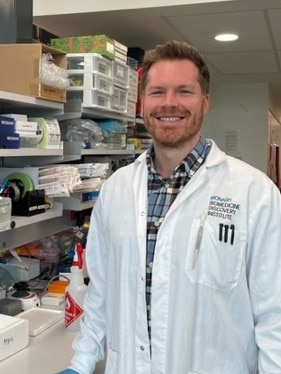Colorectal cancer: Monash Biomedicine Discovery Institute tumour breakthrough
A Melbourne academic’s chance research find may help save the lives of those battling this deadly cancer.
News
Don't miss out on the headlines from News. Followed categories will be added to My News.
A chance discovery by a Melbourne researcher may prove to be a lifesaver in the fight against deadly colorectal cancer.
Colorectal cancer starts in the lining of the colon or rectum and Cancer Council Victoria reports it is the third most commonly diagnosed cancer in Victoria, and the second most deadly.
Dustin Flanagan, of the Monash Biomedicine Discovery Institute, is part of an international team that has just published the results of a world-first study that may help identify much earlier those patients at risk of colorectal tumours that will become aggressive, treatment resistant and deadly.
In 2018 Dr Flanagan was carrying out experiments on early colorectal tumours and investigating the role of a signalling protein called Transforming Growth Factor-beta (TGFβ).
“TGFβ is meant to stop cells from growing out of control,” Dr Flanagan said.
“In other words, it’s a tumour suppressor, especially in early stages of the disease.”
What he discovered, working at the CRUK Beatson Institute in Glasgow in collaboration with colleagues at Queens University in Belfast, was that increased levels of TGFβ instead of suppressing the growth of a colorectal tumour at an early stage, actually signalled them to go rogue.

He said this increased TGFβ signalling effectively gave ‘born to be bad’ tumours the help they needed to become really nasty.
“This ‘born to be bad’ phenomenon is relatively new in terms of our understanding of these tumours because traditionally colorectal cancer starts with a particular genetic mutation and it acquires more one by one over time,” Dr Flanagan said.
“Initially one defect, then two, then three; so people thought the really nasty, aggressive features were acquired quite late.
“But we, and others, are building this idea that there is a small population of tumour cells that have all of these traits already, that they are born to bad; that they have the right combination of mutations and have acquired activation of TGFβ signalling from an early time point, even when they are not clinically detectable.”
He says it is unlikely this discovery will change population colorectal screening tests currently used in Australia as these would not detect a tumour, but they could be a potential lifesaver for those having a routine colonoscopy.
“It is possible this will help when polyps are removed for biopsy, and using what we know now to incorporate into testing for certain markers of cancer,” Dr Flanagan said.
“This could be relatively easy and could be added to a bulk standard lab test.”
Dr Flanagan said the findings, published last week in the journal Nature Communications, could also lead to improved and more personalised treatments for colorectal cancer patients who were likely to experience a relapse.
“This offers the potential to modify treatment much earlier,” he said. “Cancer treatment is moving in a direction comparable to how we might think about treating chronic illness/disease, where it is much more manageable.”
Dr Flanagan and his colleagues are now collaborating with researchers in Italy and the UK to translate the findings using patient-derived models.
“We are keen to test whether the same disease mechanisms used by primary colon tumours cells are also adopted by tumour cells that migrate to other sites in the body to establish metastatic disease,” he said.





